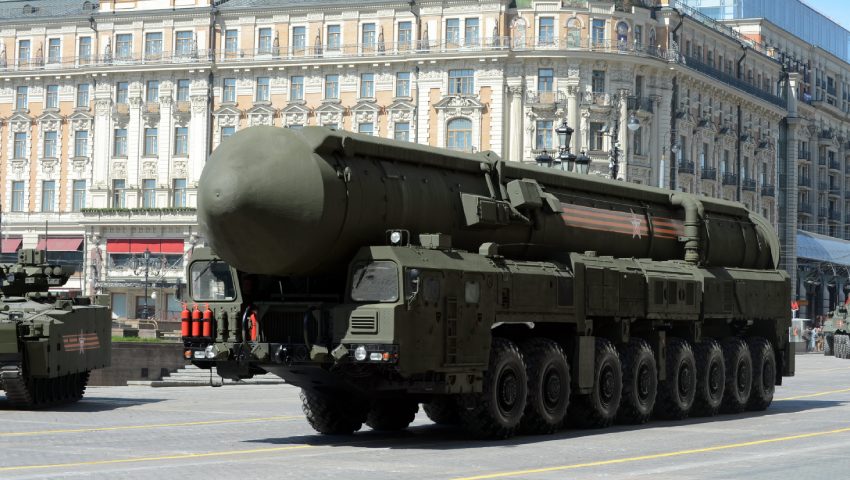Could Russia’s invasion of Ukraine have nuclear consequences?
To continue reading the rest of this article, please log in.
Create free account to get unlimited news articles and more!
Russian President Vladimir Putin’s authorisation of a full-scale invasion of Ukraine has undermined confidence in the global order, with the war signalling a return to large-scale state-on-state conflict in Europe.
In seeking to overrun Ukrainian forces, Russia has suffered hundreds of casualties since first launching its assault on 24 February, with analysts suggesting President Putin miscalculated the defensive capabilities of Ukrainian forces and the extent of co-ordinated international resistance to his actions.
Giving credence to this view is President Putin’s summoning of the nuclear threat, with the former KGB spy ordering Russia's nuclear forces to be on high alert, claiming the country has been provoked by NATO.
"Top officials in leading NATO countries have allowed themselves to make aggressive comments about our country,” he said.
But how serious is this threat?
According to an official document published by Russia in June 2021, there are four instances in which Russia would deploy a nuclear weapon:
- In response to the use of nuclear and other types of weapons of mass destruction against it and/or its allies;
- In the event of aggression against the Russian Federation with the use of conventional weapons when the very existence of the state is in jeopardy;
- When there is reliable data on a launch of ballistic missiles attacking the territory of the Russian Federation and/or its allies; and
- In the event of an attack by an adversary against critical governmental or military sites of the Russian Federation, disruption of which would undermine nuclear forces’ response options.
Rod Lyon, senior fellow at the Australian Strategic Policy Institute (ASPI), says it would be a “stretch” to suggest President Putin is building a case for a nuclear response.
“The transfer to Ukraine of lethal conventional military equipment from NATO members and other countries, at a time when a daunting array of sanctions are hitting the regime and its supporters, certainly isn’t seen in Washington, European capitals, or Canberra, as ‘aggression’ jeopardising the ‘very existence’ of the Russian state,” he writes.
“True, some commentators do see those actions as jeopardising the future of Putin’s regime, but most see them simply as incentives for Moscow to change course in relation to its intended subjugation of Ukraine.”
However, Lyon describes President Putin’s recent behaviour as “odd”, stating his long list of grievances; a “burning ambition to recreate Greater Russia”, and his “wounded pride” could be causing him to conflate Russia’s destiny with his own.
“That means, of course, that escalation is still more likely than de-escalation. Might that escalation involve nuclear weapons? Yes,” he continues.
Former US presidential candidate and White House communications adviser Patrick Buchanan also weighs in, noting this is not the first time President Putin has threatened to employ the ‘Samson Option’ — pulling down the pillars of the temple and taking your enemies with you.
On 19 February, less than a week before the invasion, President Putin ordered drills of nuclear-capable ballistic and cruise missiles, bombers and warships.
In announcing his “special military operation” in Ukraine, President Putin also warned countries that interfere would face "consequences you have never seen".
“What Putin is suggesting is that in the last analysis, if military defeat beckons for Russia, and his own dispossession of power and political if not actual death are to follow, he may use the ultimate weapon in Russia's arsenal to prevent it,” he writes.
But according to Lyon, Western intelligence would detect nuclear mobilisation, adding there are no indications of an imminent threat.
Putin, he adds, has other lethal options at his disposal, including a “more vigorous prosecution of his current strategy” — overthrowing the current government in Kyiv, installing a compliant regime in its place, and absorbing Ukraine back into Moscow’s control.
“Easier said than done, certainly, but Moscow has form in that regard,” he adds.
Lyon adds President Putin may also choose to attack supply lines through which military equipment is being delivered to Ukrainian forces.
“Strategic deterrence today doesn’t turn merely upon the old division of weapons into the conventional and the nuclear,” Lyon writes.
“Conflict has become multi-domain. Long-range precision-strike conventional weapons, options in the cyber realm, and space and counterspace weaponry are all possibilities.
“In short, nuclear weapons have so far played a larger role in the crisis than expected — but there are still many paths forward.”
In the meantime, Buchanan argues that to avoid further escalation, the United States and its allies must avoid a “widening of the war” by preventing any escalation to nuclear weapons.
“Secure the independence of Ukraine. Effect the removal of Russian troops from Ukrainian territory,” he writes.
“If this requires that Ukraine give up any ambition to become a NATO nation, Putin's declared purpose in launching the war, so be it.
“We might have avoided this war had we done so before it was begun.”
But according to Buchanan, the West is not taking this trajectory.
“Finland, and Sweden, it is now being said, should be invited into NATO,” he observes.
“Were that to happen, the US would be obligated to help defend the 830-mile Finnish border with Russia.
“This would be an act of hubris of the kind that has led to great wars.”
Get involved with the discussion and let us know your thoughts on Australia’s future role and position in the Indo-Pacific region and what you would like to see from Australia's political leaders in terms of partisan and bipartisan agenda setting in the comments section below, or get in touch with

 Login
Login







